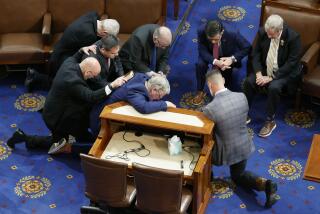Religious Leaders Must Unite in Good Faith for Common Good
- Share via
The decision by 6,800 delegates from every religion and region on Earth to meet last month in Cape Town, South Africa, at the Parliament of the World’s Religions is a sign both of the hopes and challenges that lie ahead for humanity in this freshly minted 21st century. And there are local parallels to the complex role that religion plays in people’s lives.
The delegates made their pilgrimage to Cape Town hoping to foster the work of interreligious understanding and cooperation begun at the 1993 parliament in Chicago and to support the new South Africa as it struggles to remake itself after apartheid. As a participant in the parliament, I came away with mixed reactions about what was accomplished, along with some thoughts on the local implications of the gathering.
It was impossible not to be impressed by the immense reservoir of goodwill and understanding created by the participants. They attended hundreds of informational sessions; celebrated their unity and diversity in song and ritual; searched for, and began implementing, solutions to global issues such as poverty, violence, oppression and ecological damage; and met informally. All of this resonated with the work of the county’s interfaith councils, as well as the annual Religious Diversity Faire at UC Irvine and the House of Worship tours sponsored by the National Council for Community and Justice. Clearly the interfaith movement is vibrant both here and in many other parts of the world.
However, a disappointing aspect of the event was the almost complete absence of conservative religionists, especially Orthodox Jews, evangelical Christians, and traditionalist Muslims. They were certainly invited but for a variety of theological and political reasons chose not to participate.
Again, the situation is similar in Orange County, where evangelicals in particular have, with few exceptions, not participated in any interfaith activities. This, of course, is their right, and their reasons for so doing must be respected. Chief among these is the evangelical conviction that there is only one way to salvation: a formal profession of faith in Jesus Christ as Lord and Savior. So interfaith dialogue is usually viewed as pointless and a compromising of the truth. Another obstacle is the differing stance of liberal and conservative religionists on such ethical issues as abortion and homosexuality.
Yet, cooperation in at least some interfaith activities need not compromise the beliefs of conservative Christians. For example, Orange County has a severe shortage of affordable housing, and the problem of homelessness is worsening. In Fullerton, Haim Asa, rabbi emeritus of Temple Beth Tikvah, and the Rev. Jon West of Morningside Presbyterian Church responded to the problem several years ago by founding the Fullerton Interfaith Housing Development. It has provided temporary housing to working people while they saved up money to make required rental deposits. And 21 years ago Asa and other Fullerton clergy founded Fullerton Interfaith Emergency Services to help the destitute.
Similarly, the Rev. Wiley Drake of First Southern Baptist Church of Buena Park set up a homeless shelter on church property that landed him in a legal imbroglio. The matter was finally resolved and the homeless still are being served.
Even though Asa and West undoubtedly differ from Drake on a number of political and ethical issues, all three have exhibited a compassion for the homeless that transcends such divisions. Here, then, is a project that might unite people of diverse faiths. In fact, it has done so already for the Reform rabbi and the Protestant minister from Fullerton. The ideal vehicle for people from diverse religious backgrounds to coalesce their efforts on behalf of the homeless might be the newly formed Orange County Interfaith Coalition for Social Justice under the leadership of Sister Marie Gaillac and the Rev. Bill Aulenbach.
Another area of disagreement between liberal and conservative people of faith is the role of religion in the public schools. Evangelicals have for years pushed for a constitutional amendment legalizing prayer in schools, have fought for equal time in biology classes for the teaching of creation science and sought to post the Ten Commandments in schools despite a 1980 Supreme Court decision prohibiting the practice. All the while liberal religious groups have strenuously opposed such proposals. So where is cooperation possible? Perhaps in making common cause to promote the teaching of ethics in our schools so that the parallel strands of morality found in the world’s great religious and philosophical traditions might be inculcated. The virtues of honesty, hard work, respectfulness, kindness and loyalty are examples of ethical concepts that could be taught and discussed in classes and to which no one would object.
Finally, I urge all the county’s religious leaders to heed the words of philosopher Martin Buber that “All real living is meeting.” The common-ground projects discussed here ought to be yoked to conversations that promote respect and understanding. On such meetings and projects will hinge the spiritual future of the world in the third millennium.
Benjamin J. Hubbard is professor and chair of the Department of Comparative Religion at Cal State Fullerton. He is working on a book on the challenge of religious diversity. His e-mail address is bhubbard@fullerton.edu.
More to Read
Sign up for Essential California
The most important California stories and recommendations in your inbox every morning.
You may occasionally receive promotional content from the Los Angeles Times.













